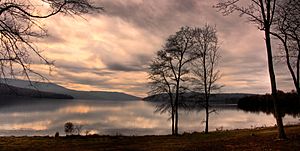Nickajack facts for kids
Quick facts for kids
Nickajack
|
|
|---|---|

|
Nickajack is a name for a hilly area in the Appalachian Mountains. You can find it in eastern Tennessee and northeastern Alabama. The name "Nickajack" comes from a Cherokee word. It might mean "Coosa Town" or "Koasati Town".
Contents
A Look Back at Nickajack's Past
In the late 1700s, there was a war between the Cherokee and Americans. During this time, the Nickajack area was home to Chickamauga Cherokee and Muscogee-Creek warriors. They lived in "Five Lower Towns" along the Tennessee River, near what is now Chattanooga. These warriors were mostly Cherokee, led by a chief named Dragging Canoe. Some small groups of Shawnee and Creek people also lived and fought with them. Sometimes, other Muskogee allies joined them too. Even some white traders, Spanish, French, and British agents, and runaway slaves lived in the area.
The Original Nickajack Town
After these wars, the town of Nickajack became very important. It was even more important than the nearby town of Running Water, where Dragging Canoe lived. Nickajack was in a great spot on the river. It was near where the "Federal Road" crossed the Tennessee River. This road went from Athens to Nashville.
One important person in Nickajack was Turtle-at-Home. He was Dragging Canoe's brother. Turtle-at-Home owned the ferry that crossed the river. He also had other businesses. He was part of the council for the Lower Towns. He even served as the Speaker for the Cherokee National Council.
Nickajack Cave's Secrets
Nickajack Cave is close to where the old town used to be. It was once called Tecallassee. The Chickamauga Cherokee might have used this cave as a secret hideout.
During the American Civil War, the cave was very important. Soldiers from the Confederate army mined bat droppings, called guano, from inside the cave. This guano was used to make saltpeter. Saltpeter was a key ingredient for making gunpowder at the Confederate Powderworks in Augusta, Georgia. The road used to carry this material became known as the "Nickajack Trail".
The Civil War and Nickajack
The "Nickajack" region was a loosely defined area in northern Alabama and eastern Tennessee. People in this region often supported the Union (the northern states) during the American Civil War.
Before the war, there was a lot of talk about states leaving the Union, which is called secession. This talk mostly came from politicians who represented wealthy plantation owners in the southern parts of Mississippi, Alabama, and Georgia. These plantations relied on slavery.
However, in the mountains of North Alabama and East Tennessee, fewer people owned slaves. Many citizens in these areas wanted to stay with the Union. Some people at the time said the war would be "a war for the rich, fought by the poor."
There was even an idea that if Tennessee and Alabama tried to leave the Union, parts of North Alabama and East Tennessee could break away from their states. They would then form a new state called Nickajack. This new state would stay in the Union. This idea never happened, but Winston County, Alabama did talk about leaving Alabama. This area is still known as the Free State of Winston. It was even mentioned in the famous book To Kill a Mockingbird.
Disagreements in the Region
On January 7, 1861, Alabama's Governor Andrew B. Moore called a meeting in Montgomery. Delegates from Alabama came to discuss whether the state should leave the Union. Delegates from South Alabama wanted the convention to decide the vote. But delegates from northern Alabama wanted the people to vote on it.
The number of delegates at the meeting was based on the total population, which included enslaved people. This meant that the Southern delegates effectively voted "for" the African-American slaves, who made up a large part of the population in the South. If the vote had been based only on white population, the power would have shifted to the North.
In the end, Alabama's Ordinance of Secession passed with a vote of 61 to 39. The votes were split based on where the delegates were from. Besides Nickajack, Winston County, Alabama also threatened to form its own Free State of Winston. These threats of breaking away never fully happened. However, many men in the region strongly resisted being forced to join the Confederate Army. Instead, many of them joined the Union Army.
 | William M. Jackson |
 | Juan E. Gilbert |
 | Neil deGrasse Tyson |

